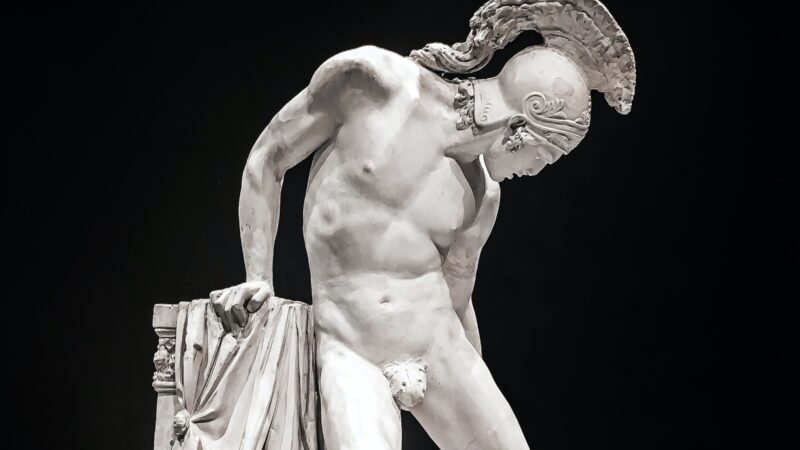Mania by Lionel Shriver (Book Review)
Lionel Shriver’s latest novel, Mania, imagines a world in which the concept of intelligence has become taboo. ‘Dumb’, ‘stupid’, ‘moronic’ and every other synonym that might adequately describe the mentally deficient have become unspeakable terms of offence, while IQ tests and entrance exams alike are outlawed on the grounds of elitism. Idiots are not a protected class, however, because the prevailing ideology posits that idiots simply don’t exist. In this egalitarian utopia, everyone is equally smart. To suggest anything to the contrary is to commit a hate crime punishable by professional ruin and social ostracism.
If this all sounds familiar, it’s because Mania is a pointed parody of the socio-political logic of what Shriver, in a recent piece for UnHerd, described as the ‘collective crazes’ of the last decade: transgenderism, #MeToo, Covid lockdowns and Black Lives Matter. Her journalism has tackled each of these movements individually and collectively, but Mania is her first work of fiction to deal with the twin forces of political correctness and cancel culture head on. It’s perhaps worth pointing out that her recent novel, The Motion of the Body Through Space, featured as part of its subplot a diversity hire whose incompetence leads to the breakdown of the transport system in Hudson, New York – which landed Shriver in hot water during a promotional tour of the book. But critics will struggle to condemn Mania as offensive. For while the novel is implicitly critical of radical progressive politics, the Mental Parity movement is a squarely fictional creation. Even in the fragile political climate of 2024, the foolish remain fair game as an object of ridicule.
Mania’s characters are recognisable archetypes of any cowed and paranoid society. Plucky, witty and dangerously opinionated, Pearson Converse is one of Shriver’s most autobiographical protagonists, mirroring everything from the author’s overbearingly religious upbringing to the rebellious mentality it imprinted on her. Her defiance in the face of the Mental Parity movement makes Pearson a black sheep in polite society, but stems from a desire to protect her two eldest children, a pair of prodigies who in any other age would have a bright future lined up for them. It is the third child, Lucy, who, having grown up in an age in which Mental Parity has become the mainstream, constitutes an unlikely antagonist, blackmailing her mother and policing her language and behaviour. It is telling that Lucy’s ideological and cognitive equivalents throughout Mania are the teachers, politicians and television presenters, and that perhaps the only other thing they have in common is an unmerited power over those who dare to speak out.
But the real conflict that rages like a dynamo from Mania’s first pages to its dramatic conclusion is more nuanced, more complicated than a simple black-and-white battle between critical thinking Davids and knuckle-dragging Goliaths. Despite Pearson’s career as a university professor, the book focuses less on the shadowy cabal of academics pulling the strings of Mental Parity than on those who are complicit with the regime, or merely undecided. It is complacency that drives a wedge between Pearson and her comparatively apolitical husband, Wade, whom she accuses of ‘sit[ting] this whole thing out on the sidelines, watching, or declining to watch.’ Far more sinister is the character of Emory, Pearson’s lifelong pal, whose position on the whole thing is not neutral but ambiguous. What makes Emory particularly villainous is not that she is a believer, but that she is a non-believer, prepared to manipulate the burgeoning climate of paranoia for her own gain, advancing her career as a talkshow host by producing disingenuous op-eds on microaggressions or thought crimes and thereby embodying, by Pearson’s account, ‘the intelligent face of stupid’.
As Emory rides the coattails of this movement, Pearson’s own career – not to mention her family life and reputation – begins to spiral. Her first brush-in with the tyrannical power of Mental Parity comes when she assigns her literature class a novel that the self-anointed censors have exorcised from the Western canon. The scene is reminiscent of the opening of last year’s American Fiction, in which Monk, a black professor, writes on the class blackboard the name of a Flannery O’Connor story, only for a blue-haired white girl to object that she finds the title – ‘The Artificial Nigger’ – offensive. Monk is laid off from his job as a consequence. Pearson doesn’t quite lose her job for assigning Dostoevsky’s The Idiot to her class, but the stunt earns her the resentment of colleagues and students both, as well as a stern warning. What leads to her eventual dismissal is her later deployment of the word ‘retard’ during a tirade in class. Typically, the scene is filmed by every student in the class and uploaded to the internet.
Pearson is not even safe within her own home, which she considers a sanctuary of normality – only for Lucy to report her to social services. As a result, Pearson is required to take a six-week Cerebral Acceptance and Semantic Sensitivity class, with the aim of weeding out elitist language from her vocabulary:
Considering that ‘grasp’ could convey mastery some people lacked, we should instead ‘grip’ or ‘seize’ our coffee mugs. ‘Command’ could also mean an unjustifiable sense of intellectual dominion, so in a position of authority we should issue an ‘edict’ or ‘direction’. Admiring classifications such as ‘savvy’, ‘scholarly,’ and ‘erudite’ couldn’t help but imply the existence of benighted characters who exhibited none of these qualities, so if we were hell-bent on acclaiming colleagues, we should keep to wholesome, simple – sorry, uncomplicated – compliments such as ‘I like you’ or ‘That is good.’
If the attempt to jettison every contaminated word in the English language seems overkill, recall the institutional scramble only a couple of years ago, in which colleges across America issued ‘harmful language’ lists to students, singling out problematic obscenities such as ‘field’, ‘blackboard’, ‘straight’, ‘American’ and – you guessed it – ‘stupid’. Shriver herself conducted a highly entertaining takedown of this phenomenon for the Spectator. One gets the sense that this sterile dumbing down of the English language is what irks her the most, since the straitjacket of minimally offensive newspeak could not be further from the vibrancy and elasticity of the author’s own style. The unfortunate fact for her enemies is that Shriver is one of the most capable writers around. Her insights are profound and her prose is lucid, every sentence an immaculately crafted marvel of colloquial lyricism.
There is a disconcerting familiarity to the events of Mania, which echo some of the more maddening episodes of the last few years. From Sherlock to Columbo, films and TV shows which are seen to promote the notion of ‘cleverness’ are taken off air and removed from circulation. And a campaign to rename the city of Voltaire gains traction, since the views espoused by the author of Candide are no longer in step with those of its residents.
In a conversational aside we learn that the rest of the world thinks the West has lost its marbles. It’s clear that Shriver has borrowed liberally from the events and controversies that have defined the zeitgeist, but Mental Parity is a creation all her own. Indeed, the titular mania is such a powerful force that it has the effect of sidelining all other social justice movements. Anders Breivik receives public sympathy after murdering 69 members of the Norwegian Workers’ Youth League for exhibiting ‘less than spectacular intelligence’. Not only is the concept of Islamophobia absent from political discourse, but Western society’s fascination with race itself has become blessedly passé – to President Obama’s detriment. ‘Nobody gives a crap anymore about his being a black president,’ Emory states, when the Mental Parity movement is still in its infancy. ‘He’s a know-it-all president. It’s death.’ His replacement is the ‘impressively unimpressive’ Joe Biden, acclaimed for his ‘delectably leaden’ speaking style. But when even the doddering ineptitude of a potentially demented president proves insufficient to satisfy voters, the Democrats find a new champion in the form of Donald Trump. Across the pond, meanwhile, the UK’s decision to leave the EU becomes a win for progressivism, given the tendency of many Remainers to demonise Brexiteers as stupid.
The good thing is that this imagined mania is so much worse – and therefore more entertaining – than any of the real manias currently afflicting the Western world. Thanks to the Mental Parity movement, food produced in the US is no longer safe to eat, nearly all fatalities in the armed forces are caused by friendly fire and a brain drain has left America stunted, handing China and Russia the keys to world domination.
But while Mania is funny, razor-sharp and extremely readable, it’s also eerily realistic. For the seeds of Mental Parity may already have been sewn, and not just in the soil surrounding the R word. Universities are increasingly eschewing standardised examinations, while columnists wage war against the very idea of meritocracy. What’s more, in a further affront to the English language, last month it was announced that a new version of Scrabble was being released with simplified rules, in order to make the game ‘more accessible for anyone who finds word games intimidating’. If Lionel Shriver’s alternative history becomes the actual future, this fine novel will be the first for the chopping block. Read it while you still can.








The Need for Roots by Simone Weil (Book Review)
Born in Paris on the 3rd February 1909, Simone Weil was the youngest of two children born to an intellectual and non-observant Jewish family. Stricken by appendicitis as an infant, Weil suffered from ill-health throughout her short life. Academically brilliant, intense and morally uncompromising, Weil intimidated and bemused those she encountered – her tutor, Emile Chartier, dubbed his otherworldly charge ‘the Martian’. Restless, and intent on understanding life outside of her natural, bourgeois, milieu, Weil spent time as a factory worker and fighting (briefly and ineffectually) for the anarchist CNT/FAI during the Spanish Civil War. Following a series of mystical experiences, Weil found herself drawn to the Catholic Church, though it is unknown whether she allowed herself to be baptised.
Exiled from her homeland during the Nazi occupation, Weil worked for the Free French in London, and there is reason to believe she had been accepted for training by the Special Operations Executive before ill-health intervened. In 1943, weakened by tuberculosis but refusing to eat more than was permitted to citizens of occupied France, Weil succumbed to cardiac failure in a Kentish sanitorium. Her resting place can be found in the Catholic section of Bybrook Cemetery, Ashford.
Weil’s writings have found enthusiasts as ideologically diverse as Albert Camus and T. S. Eliot. Her detractors range from Susan Sontag (for whom Weil was ‘fanatical… ridiculous…’) to her boss Charles de Gaulle, who derided her as ‘crazy’.
L’ENRACINEMENT
In 1942, the Free French invited Weil to submit her thoughts on the regeneration of France, post-liberation. Weil’s paper outlined her vision for the spiritual reinvigoration of her homeland, and is her most systemic treatise on political issues. Published posthumously as ‘L’Enracinement’ in 1949, the book was translated into English in 1952 with the title ‘The Need for Roots’. Originally published by Routledge, it appears in a new translation by Ros Schwartz, under the Penguin Classics imprint.
The Need for Roots is an eccentric and uneven work, too baggy and unfocused to offer a blueprint for political action. Like the best of Weil’s writing, its strength is in the originality of her thought – even where she is wrong Weil is wrong in interesting and original ways. Weil’s analyses, and her critique of the social cost of modernity – rooted in an organicist conception of society – will be of interest to the kind of conservatives who read The Mallard.
RACINEMENT AND DERACINEMENT
‘Roots’ and ‘rootedness’ – ‘racines’ and ‘racinement’ – enjoyed a vogue on the French right before Weil. Maurice Barrès, author of Les Deracines, outlined a republican vision of ‘la terre et les morts’ – the mystical bond shared by a people living on, and working, the land in which their ancestors enjoy their eternal rest.
Weil, ironically perhaps, understands roots in less mystical terms:
For Weil, roots arise organically among people thrown together by circumstance, and are multifaceted – anchoring the individual in, for example, a community, a nation, a professional milieu. Through these spontaneous bonds of language, culture and place the individual finds identity and meaning.
When roots are severed, the individual feels himself estranged, and is deprived of an opportunity to participate in the pursuit of a Good beyond himself. Enracinement provides the individual with meaning – imbuing his everyday relationships with eternal, even supernatural significance.
At a political level, roots give the individual ‘a sense of personal ownership’ of ‘public monuments… and the lavishness displayed in ceremonies’. The rites and rituals of civic religion orient the individual toward the Good, as his culture understands it. The individual witnesses a great ceremony of state – a coronation, or a military parade – and understands that the rite is just as much an expression of his identity as, for example, Sunday Mass at the village chapel. Through racinement, the individual understands himself to be a participant in his culture, and feels that he has an interest in the spiritual and cultural health of his community and nation.
Deracinement, then, is a spiritual malady, an alienation from one’s culture and the conceptions of the Good that have shaped it. Uprootedness on a grand scale can be occasioned by revolution, military conquest or population displacement. It is interesting to speculate on what Weil would have made of the mass immigration that has transformed Europe in the post-war era.
ROOTS AND NATURAL ORDER
Empathy, for Weil, is the soul of patriotism. It is easier to feel empathy for people with whom one shares bonds of language, culture and place. It is from these bonds of trust and social solidarity that, in a healthy society, order arises.
For Weil roots are the basis of order. Order is the pre-eminent human need – the guarantor of all subordinate needs. In a healthy society, order flows from the bottom-up; a product of ‘compassion’ and trust. This naturally-arising order is distinct from the ‘top down’ constitutional politics of liberalism.
Freedom, like order, cannot be imposed upon a people, rather it must emerge from among them. This is perhaps Weil’s most important lesson for the contemporary right. No western libertarian cites Somalia and Haiti as an ideal for his society to follow, despite both countries’ longstanding traditions of limited (or at least, weak) central government. It is not sufficient to simply limit the reach of the state. Rather, certain social preconditions, principally a culture of mutual trust, must exist if a free, orderly society is to flourish.
Whereas man under liberal democracy understands his relationship with the state formally, in terms of ‘rights’, through ‘enracinement’ the individual understands the interrelatedness between his rights and the obligations that he owes his fellows:
LEFTISM: A POLITICS OF ROOTLESSNESS?
Liberalism, founded on a universalistic conception of human nature and the absolute sovereignty of the individual, is hostile to rootedness, and thus the organic ties of heritage, culture and place in which healthy identities are founded. And, as Weil observes, uprootedness has the dangerous quality of propagating itself.
Marxism, Weil suggests, is not merely driven by uprootedness, but seeks its universalisation – the reduction of everyone to the status of the proletarian. For Weil, uprootedness was exemplified by the industrial working class of her day; condemned to repetitive and physically exhausting labour, and forced to live in unlovable slums.
Industrialisation elevated the material standard of the common man, but did so at tremendous spiritual cost. The lot of the peasant was hard, but he at least enjoyed the consolations of meaningful labour and a life lived among natural beauty – often on land worked by his ancestors. The proletariat, by contrast, are inescapably aware that they are interchangeable cogs in an economic machine.
The strange revival of Marxist (or at least Marx-ish) politics in the post-Soviet era can be understood as a manifestation of alienation. It is not that Marxism offers a compelling alternative to the current order; rather, Marxism retains an enduring appeal to the uprooted. When people feel estranged from their culture, they desire its destruction. It is not enough for the Communist to triumph over the old order, he must destroy all vestiges of the past. Witness the mad vandalism of the Cultural Revolution, or, in our time, the toppling of statues by those who have been taught to consider western history as uniquely shameful.
In our era ‘deracinement’ manifests in many ways. Witness the proliferation of bizarre sexual subcultures; notably ‘trans’ and ‘non-binary’ identities; among educated left-leaning whites. Ersatz identities such as these provide a sense of belonging and an opportunity to pursue imagined ‘Goods’, in the form of liberation and ‘social justice’. But they thrive on angst and guilt – and propagate the dangerous idea that fulfilment is impossible without radical transformation of the self and society.
Contemporary uprootedness takes other, less dramatic forms: a tendency (found on both left and right) to confuse one’s personal and political identities, for example, or an exaggerated identification in the struggles of peoples very unlike one’s own. Alienated from their own political culture, Zoomers often fail to appreciate the cultural specificity of foreign issues – or, conversely, to map American racial politics onto their own (this writer recalls one especially pathetic incident in which demonstrators in London, protesting the homicide of George Floyd, an incident that occurred on another continent, chanting ‘hands up, don’t shoot’ at unarmed constables of the Metropolitan Police).
The European right, too, is tainted by the uprootedness of the modern world. Witness the awe in which post-war ‘conservatives’ have held America, a land of uprooted individuals, where history is shallow and order proceeds from the top down in the form of a Constitution and a Bill of Rights.
WE NEED ROOTS
Weil’s most important lesson for the conservative movement is that man has needs beyond the economic. She stands against an era in which:
An authentically conservative politics should define itself against the reduction of people to mere economic units; and towns, regions, countries as mere places. We are the custodians of the institutions and traditions that we have inherited. The triumph of capitalism over feudalism has undoubtedly improved life in material terms; but capital, unchecked, uproots peoples from traditional ways of life, destroying communities and cultures. As Weil argues, the destruction of the past is ‘perhaps the greatest of all crimes’, for, once destroyed, the past can never truly be recovered.
The ills that Weil identified in her own age have grown more acute in the post-war era, thanks both to the moral revolution of the 1960s and the triumph of the market in the 1980s. It is a sad but inescapable fact that ‘conservative’ parties, today dominated by different flavours of free-market liberal, have played their role in accelerating this process of deracination.
Conservatism – authentic conservatism – offers a politics that understands men as more than the sum of their appetites and ambitions. Weil’s prescient vision of European revitalization deserves a new audience on the right. It is time for conservatism to rediscover its roots.
Photo Credit.